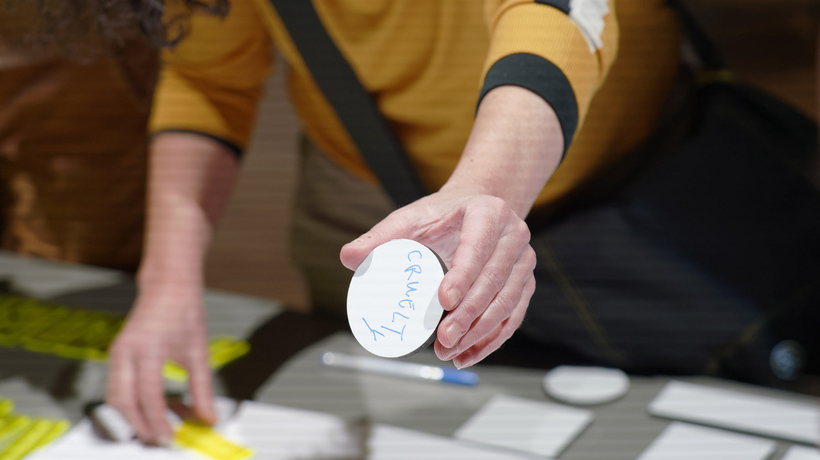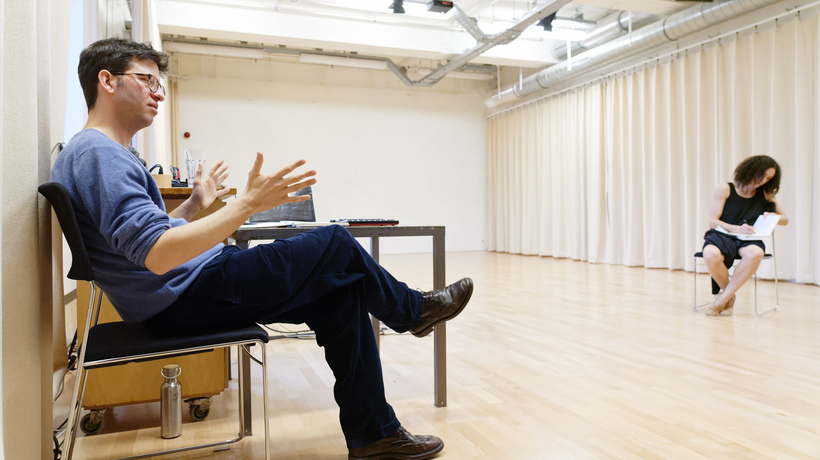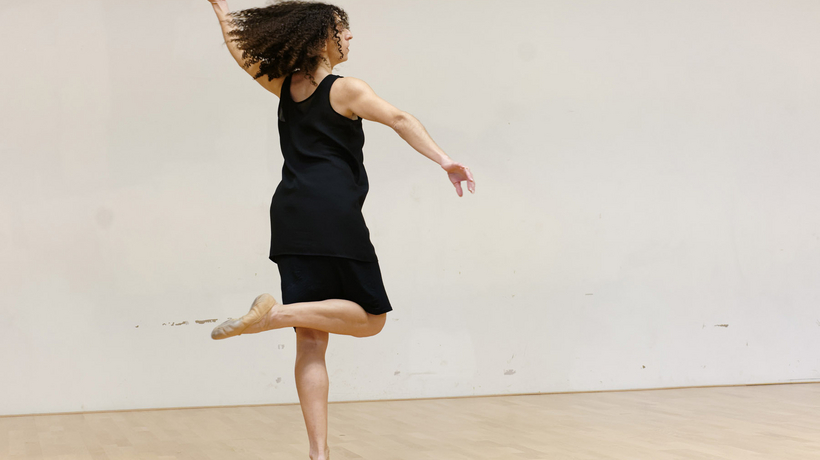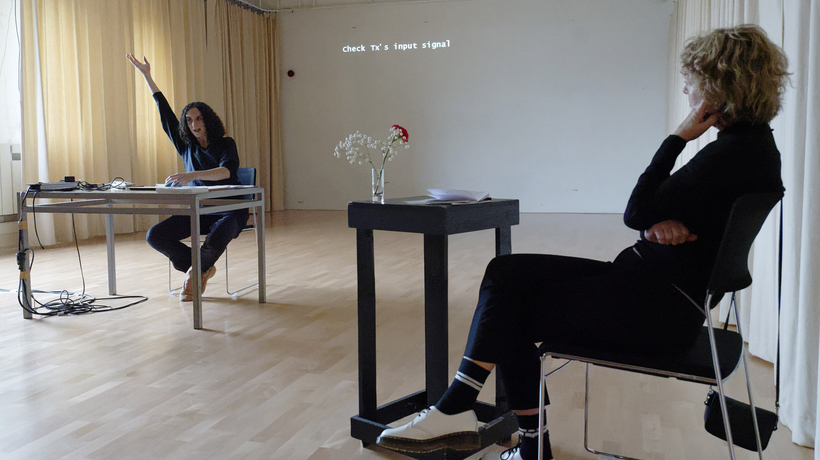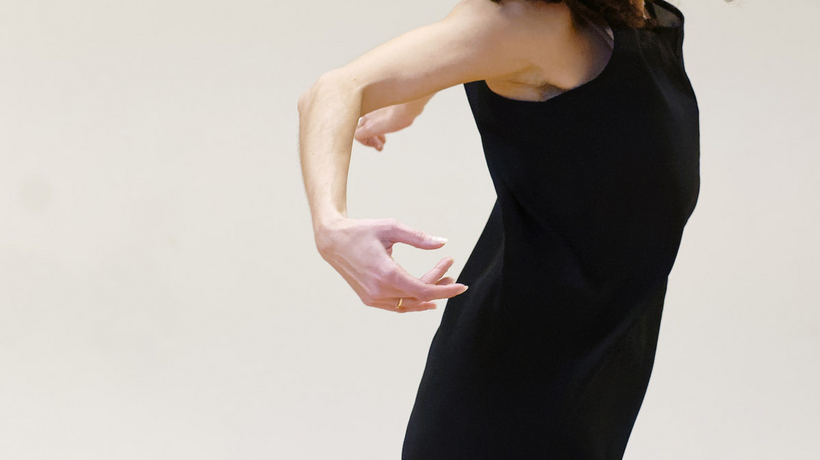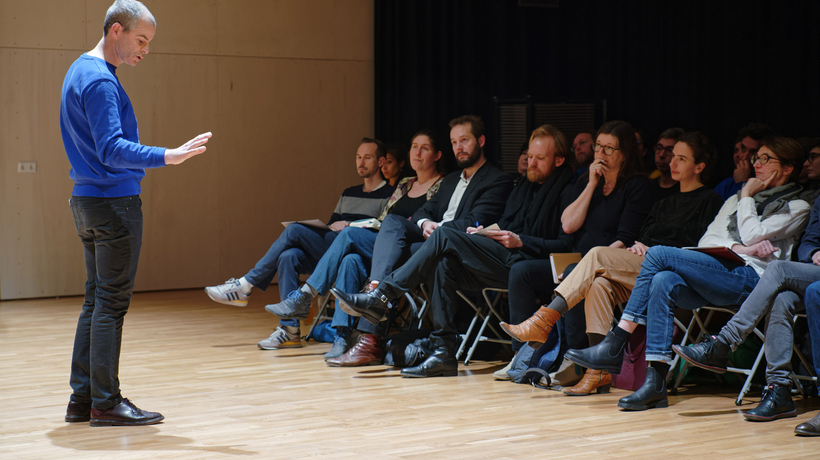THIRD Annual Forum 2018
On Friday 14th December and Saturday 15th December the first public Annual Forum on 3rd cycle research takes place at DAS Graduate School. During this special weekend artists from dance, theatre and film pursuing research in educational institutions throughout Europe individually and collectively present their ongoing projects in parallel sessions.
All pictures on this page by: Thomas Lenden.
Programme & location
- 14.30h – 15.00h: welcome at Perdu
- 15.00h – 16.30h: performance ‘Papier Multiforme et Papier Comestible’ by Emilie Gallier in Perdu followed by a cinematic response by Agnese Cornelio (theatre and filmmaker, researcher of THIRD); a prepared response by Augusto Corrieri (theatre maker, writer), also known as Vincent Gambini (magician); and a live response by Margarida Guia (sound artist). *
*Due to limited capacity this session is fully booked
Change location to DAS Graduate School
- 18.00h – 19.00h: opening of the Annual Forum by Marijke Hoogenboom and Sher Doruff . Mapping the Cartography of a Shared Research Landscape, led by the cohort in collaboration with Axelle Grégoire and Matthieu Blond, Société d'Objets Cartographiques (SOC), at DAS Graduate School
- 19.00h: communal dinner
10.00H – 11.30H Two parallel sessions:
SUZAN TUNCA (studio 2.09)
Resonances between Dance and Gnosis
In collaboration with Giuliano Bracci. Respondent: Janneke Wesseling
JULIEN BRUNEAU (studio 2.17)
Of impersonal gaps and places of concerns
With interventions by Rosie Heinrich and Jennifer Lacey
11.30H – 11.45H Coffee break
11.45H – 13.15H Two parallel sessions:
ALICE CHAUCHAT (studio 2.09)
Topic, Figures, Nuance: learning about (my own) artistic research from Roland Barthes’s engagement with
the elusive
Respondents: Bojana Kunst and Siegmar Zacharias
AGNESE CORNELIO (Theatre 2.04)
[Working title]
Respondent: Eyal Sivan
13.15H – 14.30H Lunch
14.30H – 16.00H Two parallel sessions
DAVID WEBER-KREBS (2.04)
The Actual Event
Respondent: Jeroen Peeters
EDIT KALDOR (2.17)
Dramaturgies of Not-Knowing (to Wreck us All)
Joint lecture with Bart Philipsen
16.00H – ONWARDS Informal gathering and drinks
-
Friday 14.30-16.30: Perdu, Kloveniersburgwal 86, 1012 CZ Amsterdam
- Friday night and Saturday: DAS Graduate School, Overhoeksplein 2 (2nd floor), 1031 KS Amsterdam, the Netherlands
Sessions
Agnese Cornelio
[Working title]
What make us free? Do we become free when we cease to work, or are we freed through the act of work itself? Nobody, not even Marx has an answer. The repeated gesture of the workers themselves respond to this dialectic. [Working title] is the reenactment of a reenactment.
The first article of the Italian Constitution says that “Italy is a democratic republic founded on work”. But she, as many others Italian citizens did, had to leave, because there is no work.
The film retraces what remains of the work that people used to do, how it is inscribed
in the bodies and stuck in the memories of nine Italian migrants. In a grey room, they
rehears and reenact recalling and repeating, as in a theatrical performance, words and gestures of their past jobs, tapping into humor, poetry and monotony of repetitive mundane activities.
In a temporary editing room, the director compiles these memory into the larger narrative of a documentary film “fondata sul lavoro” and unfolds his own process, to reconstruct a personal genealogy of the transition from manual and material labour into immaterial work
Respondent: Eyal Sivan (documentary filmmaker and theorist, head of research at Master of Film, Netherlands Film Academy AHK)
Agnese Cornelio (IT) is theatre and filmmaker focusing on the crossovers between film and performance.
Alice Chauchat
Topic, Figures, Nuance: learning about (my own) artistic research from Roland Barthes's engagement with the elusive
As I try to map out my research process from a methodological perspective, Roland Barthes comes to my help. In the introductions to his lecture series for the College de France – “How to live together?” (1977) and “The Neutral” (1978) – he set out each time to pursue a personal desire of his, which he would start with naming before wandering around it: moving it across a grid or library, extracting a number of possible figures. Each figure highlights an aspect of the motorizing fantasy, the topic, giving it a body as nuances accumulate.
For this lecture I will elaborate on my sympathy for his approach and the ways it resonates in my own process, as well as the gaps between both (to name the biggest for now: I produce the library myself). Through doing this, I hope to lay out the current dynamics at play in my research: between experiential knowledge and fiction, between analysis and intuition, across dance scores, dances and dancers, the continuous effort to articulate and the care not to simplify.
Respondents are Bojana Kunst (Philosopher and performance arttheorist. Professor at the Institute for Applied Theatre Studies, Giessen) and Siegmar Zacharias (performance maker, researcher, curator and researcher of THIRD)
Alice Chauchat dances, choreographs, teaches, supports peers, makes up structures for thinking and developing together. As a PhD candidate she is affiliated with the Institute for Applied Theatre Studies in Giessen (D).
David Weber-Krebs
The Actual Event
In this session I want to present a performance I’d like to realize. A performance that seems impossible to realize because it reaches to the limits of what we can experience in a theater with our senses. I want to share the desire for this performance with the spectators. And maybe we can create still create it together a little bit…
This will be the occasion to reflect on the
potential of approaching the theatre space as a fragile ecosystem where different agents meet, humans and non-humans, and where they are radically entangled. And this will be the occasion to reflect on the special responsibility of the human in that apparatus.
Respondent is Jeroen Peeters (writer, dramaturg and performer, inventor SARMA.be)
David Weber-Krebs (BE/D) is active as a performer, director, researcher and curator. He is based in Brussels and a PhD candidate at KASK, Hogeschool Gent (BE).
Edit Kaldor
Dramaturgies of Not Knowing (to Wreck us All)
During this joined lecture first Professor Bart Philipsen will reflect theoretically on Edit Kaldor’s artistic work and how it attempts to expose and develop productive forms of not-knowing, based on the fundamental acceptance of rupture in relating to the other. Then Kaldor will share connected aspects from her current artistic research project The Many and the Form: Working Methods for Participatory Co-Creative Practices in Contemporary Theatre. In her talk she will address notions at the core of the research, like theatre as situation, rehearsing difference and non-understanding, and performance-making as open-source practice.
A discussion with the audience concludes the session.
Joined lecture with Professor Bart Philipsen (German Literature and Theatre Studies at KU Leuven)
Edit Kaldor (H/US/NL) is theatre maker, writer, dramaturge. She is currently artistic research fellow at the Norwegian Theatre Academy and preparing a PhD at the University of Amsterdam.
Emilie Gallier
‘Papier Multiforme et Papier Comestible’
PERFORMANCE OF READERSHIP AROUND MAGIC, HANDS, AND EYES
Emilie Gallier studies forms of dance documentation that propose an experience of reading to the audience, in the moment of performance. Her question is: what happens in performances when the audience is reading? ‘Papier Multiforme et Papier Comestible’ is a performative chapter of her PhD thesis where readership is examined in proximity with magic. It is a performance which gathers two performances in one, two spaces in one, making a total of three spaces for three audiences. We practice modes of spectatorship in magic, reading, and ghosting. How to be together implicated? What happens when the document performs and dissolves? In a vast and dark landscape where dream-like scenes appear and disappear, we research subtle presences, qualities of participation, impertinent absence and exercise of ubiquity, of being elsewhere.
The performance is a collaboration with Tilman Andris, Jamillah Sungkar, Nicola Unger, Camille Gerbeau,
Nina Boas, and Katinka Marac.
With a cinematic response by Agnese Cornelio (theatre and filmmaker, researcher of THIRD); a prepared response by Augusto Corrieri (theatre maker, writer), also known as Vincent Gambini (magician); and a live response by Margarida Guia (sound artist).
Emilie Gallier, dancer, choreographer and researcher and a PhD Candidate at C-DaRE, Coventry University since 2016.
Julien Bruneau
Of impersonal gaps and places of concerns
What is in act when “I” am acting?
Could I relate to my own experience in an impersonal manner? That is, without identifying with, owning or authoring the experience unfolding in me ? In this research, these questions are put at play in the relationship we have with space. Addressing distinctly various kinds of places – domestic, public or artistic – with ad hoc dramaturgical set up, it explores how the performance of affected-yet-impersonal presence meet the situated perspective and concerns of the people inhabiting and using these very places.
This presentation takes the form of a little narrative. It progressively goes from an individual practice of receptivity to the artistic practice of “being invited by the space” and examines the performance Genius Loci, conceived for domestic places in a phase of transition. How do you point towards impersonal presence? And how could it matter for people entangled with their home through very personal ties?
Oscillating between talking and doing, this presentation partly describes the research, partly enacts elements of it. Giving also a stage for collaboration and other artistic voices with interventions by THIRD participants Rosie Heinrich and Jennifer Lacey, it embarks at times into associative speculation in order to consider larger resonances of what it is to inhabit the places we are inhabiting.
The research is developed thanks to the commitment of long-term collaborators and dance artists Maya Dalinsky, Anouk Llaurens and Sonia Si Ahmed to whom I owe a deep gratitude.
Julien Bruneau (B) is a dancer, choreographer and visual artist based in Brussels.
Suzan Tunca
Resonances between research in dance and gnosis
I. The evolution of an essay
How to create a research framework that allows the questioning of embodied gnosis through dance? A presentation about the evolution of an essay assignment in the context of the PhDArts doctoral programme and about knowledge and insights gained along the way. Embodied gnosis is here taken as a departure point for the creation of a dance language and for questioning its epistemological dimensions. It indicates a state of inspired being and knowing where supra-sensory (meta–empirical) qualities of experience, such as for example spatial imagination and compositional/performative intuition coincide with specific qualities of motion that permeate the physicality of the dancer and the space of the performance.
II. SEI – a dance and music performance
SEI is an experimental performative research where dance becomes an instrument to investigate and to communicate an intuitive knowing and being engendered by the experience of inspiration and suspended in an imaginal realm between the logic of a dancing body and faith. The performance is developed in collaboration with composer and docARTES member Giuliano Bracci.
Respondent is Janneke Wesseling (PhDArts Leiden University and professor in Art and Research at the University of the Arts, The Hague.)
Suzan Tunca is a dance researcher and performing artist affiliated with ICK Amsterdam and Codarts, and a PhD candidate at PhDArts (NL).

About THIRD
DAS Graduate School initiated this support structure for 3rd cycle research in 2016. It is a unique facilitating model designed as a twoyear trajectory for smallscale learning cohorts of seven fellows each year. THIRD prepares theatre and dance artists for 3rd cycle research opportunities through the processes of refining their individual artistic research proposals, sharpening their national and/or international aspirations, and defining their affiliation as well as funding possibilities. The cohort environment generates collective experiment and reflection on the potential of artistic research.






